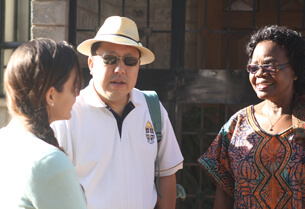After a three-day consultation for the Anglican Alliance’s Advisory Council, hosted by the Council of Anglican Provinces in Africa, the final discussions drew to a close. The Council members had come together from all across the Communion, from Latin America through to the Pacific.
Advisory Council members spent the last day in Nairobi reflecting on their time together and committing to take the mandate and vision of the Anglican Alliance to their dioceses, provinces and regions.
Revd. Capt. Richard Mayabi, who visited from Church Army Africa, spoke on the Church’s role in an increasingly urbanised world and the opportunities and challenges that this brings to church mission. Key issues such as youth empowerment, poverty reduction, and the challenges of globalisation were discussed, and the Advisory Council reflected on the role of the Anglican Alliance in this changing paradigm.
Priority themes for the Anglican Alliance were also shared with the Council, including modern slavery/human trafficking, youth and women’s empowerment, disability issues in relief contexts, and conflict prevention, peace and reconciliation. Feedback was given and the next steps for the priorities were discussed. The significance of the priorities regionally as well as globally was highlighted as council members shared the work of churches in their regions on these issues.
Members also contributed their thoughts on emerging issues that could face the Anglican Church in the years to come, and how the Anglican Alliance could work in these areas.
They included:
– Health: learning from the Church response to HIV/AIDS and the Ebola crisis;
– Interfaith work: to share ideas on good practice for promoting peace;
– Gender Justice: to broaden the approach beyond gender-based violence to other gender justice issues, while encouraging global attention on the problems of the alienation of male youth;
– Intersecting inequalities: to consider how various vulnerabilities inter-relate, such as women’s and youth disempowerment, disabilities and stigma, indigenous rights and justice, and our response to the ‘new poor’, created by the economic crisis, for whom traditional approaches may not be appropriate;
– Mission: working with the Mission initiatives of the Anglican Communion to promote global gatherings, give a theological framework for our understanding of mission and development, and encourage the growth of the Anglican Church worldwide;
– Leadership and governance: to influence how global financial systems work and support coalition campaigns, as well as mapping where advocacy is successful both within churches and from the Church to the State.
Council members were asked to reflect in regional groups on what they thought the Anglican Alliance would look like by 2020, if it was fulfilling its mandate and adding value to the Anglican Communion.
All regions agreed that sharing experience and good practice was vital to the success of the development, relief and advocacy work of the Communion, and that dioceses and parishes should be well networked to connect to the Anglican Alliance and the work of churches in other countries and regions.

In every case the Anglican Alliance would be a platform for sharing the good news and give space for Anglicans worldwide to connect, acknowledging the church’s unique contribution to ending poverty and injustice in every region of the world.
Primate of the Anglican Church of Kenya Archbishop Eliud Wabukala and Mrs Wabukala joined the Advisory Council for dinner one evening. Archbishop Eliud also invited a delegation from the Advisory Council to visit the Provincial Office in Nairobi to discuss the Anglican Alliance’s vision for mission and development. The photo shows Archbishop Eliud and Mrs Rhoda Wabukala with Revd John Deane, Chair of the Anglican Alliance Advisory Council and Executive Director of the Anglican Board of Mission in Australia.
After the consultation, members of the Advisory Council reflected on the experience:
“My faith and belief in the Alliance has been extraordinarily increased. My commitment is to do whatever I can to share this excitement and build awareness of what the Alliance is doing”. Canon Eliud Njeru, Christian Aid Africa Regional Office, Kenya.
“I’ve felt inspired and challenged in different ways, and encouraged in how I can respond”. Canon Robert Kereopa, Executive Director, Anglican Mission Board, Anglican Church of New Zealand, Aotearoa and Polynesia.
“Before I came here the Anglican Alliance was remote and external to me. Now I can see how every person in the Anglican Communion are members of the Alliance. Now I can make the Alliance more known, starting in my diocese and province”. Bishop Brent Alawas, Diocese of the Northern Philippines, Episcopal Church of the Philippines.
The report on the Advisory Council’s discussions will be available shortly on the Anglican Alliance website.
In the picture, from left to right: Elisha London, Andrew Khoo and Eleanor Daka.

